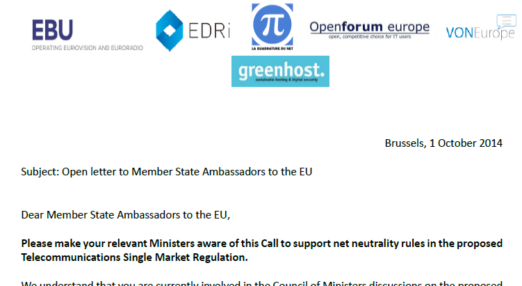Blogs
Filter by...
-

Summary of the Commissioners-designate hearings
Between 29 September and 7 October the hearings of the Commissioners-designate in the European Parliament took place. This is a brief summary of the six hearings when the Commissioners-designate were answering to the MEPs’ questions regarding digital rights, privacy issues and trade agreements. Guenther Oettinger (Germany) is the nominee for the Digital Economy and Society […]
Read more
-

Despite compromising document, Malmström is here to stay
On 29 September the public hearing on Cecilia Malmström, the EU Commissioner-designate for Trade took place. The day before, Der Spiegel published an article revealing an email exchange indicating that Malmström and/or her cabinet had been covertly working with the US at an early stage in the development of the European Commission’s General Proposal for […]
Read more
-

Romania: The aftermath of the second CCR data retention ruling
As previously reported in the EDRi-gram, the Romanian Constitutional Court (CCR) ruled in its decision no. 440 on 8 July 2014 that the second Romanian data retention law (no. 82/2012) was not constitutional. The full reasoning for this was published in the Official Journal on 4 September 2014 in Romanian. EDRi-member ApTI is working on […]
Read more
-

Italy: Administrative copyright enforcement unconstitutional?
Leggi l’articolo in italiano qui: https://edri.org/italia-procedimento-amministrativo-incostituzionale-sul-diritto-d-autore On 26 September 2014, an Italian regional administrative tribunal referred a question regarding the constitutionality of the administrative enforcement procedures foreseen by a new regulation on online copyright infringement to the Italian Constitutional Court. The Regulation on Online Copyright Infringement entered into force on 1 April 2014. It allows […]
Read more
-

Net neutrality: NGOs and industry join forces in an open letter to EU ministers
Today, EDRi together with several NGOs, consumer groups and industry representatives sent an open letter to the Council of the European Union, calling for Telecoms ministers to support strong net neutrality rules in the EU. The Council is currently reviewing the proposal of the Telecoms Single Market Regulation, voted on by the European Parliament in […]
Read more
-

ENDitorial: Italian position on IP Enforcement – the essence of insanity?
On 11 September, the Italian Presidency of the European Union submitted a discussion paper to the Council (see link below). The paper explains that, following the “review of Directive 2004/48/EC”, the controversial, so-called “Intellectual Property Rights Enforcement Directive” (IPRED) and the public consultation, it is “clear that the current legislative framework is not necessarily fit […]
Read more
-

Risk-based approach to data protection: risky for fundamental rights
On 18 September an EU Council document related to the draft EU data protection regulation was published. The document summarises the positions of Member States that have given their views on a so-called “risk-based approach to data protection”, within the context of the (so far) 30-month negotiations on a review of European data protection legislation. […]
Read more
-

Romania: Mandatory prepaid SIM registration ruled unconstitutional
The Romanian Constitutional Court (CCR) ruled on 16 September 2014 that a law that required the mandatory registration of all prepaid SIM cards and free WiFi users, is unconstitutional, as a whole. The Court reviewed the law as a result of the Romanian Ombudsman’s objection concerning its possible unconstitutionality. Several human rights NGOs asked the […]
Read more
-

France adopts anti-terror law eroding civil liberties
On 18 September 2014, the near empty French National Assembly adopted the “law strengthening the provision relating to the fight against terrorism”. In an atmosphere marked by “apocalyptic” anxiety and speeches on the terrorist threat, particularly within the Internet, minister Bernard Cazeneuve and rapporteur Sébastien Pietrasanta wore down all opposition, blocking any further reflection on […]
Read more
-

Panoptykon called on MEPs to stop mass surveillance
On 11 September 2014 digital right activists and advocates around the world commemorated the anniversary of 9/11 terrorist attacks on the WTC as the Freedom not Fear Day. It reminded decision makers and society as a whole that “absolute security” is a fallacy that can never be achieved, even in return for giving up all […]
Read more
-

The Turkish government tightens its grip over the Internet
On 8 September 2014, the Turkish parliament passed an amendment to the already draconian Internet law. The amendment allows the Turkish Telecommunication Authority (TIB) to block (without a court order) any website that appears to threaten “national security or public order”. Internet Service Providers (ISPs) are required to execute the blocking order of the TIB […]
Read more
-
Public Oversight and The Rule of Law
Between 15th-19th of September, in the week leading up the first year anniversary of the 13 Necessary and Proportionate Principles, EDRi, the EFF and the coalition behind the Principles will be conducting a Week of Action explaining some of the key guiding principles for surveillance law reform. Every day, we’ll take on a different part […]
Read more
